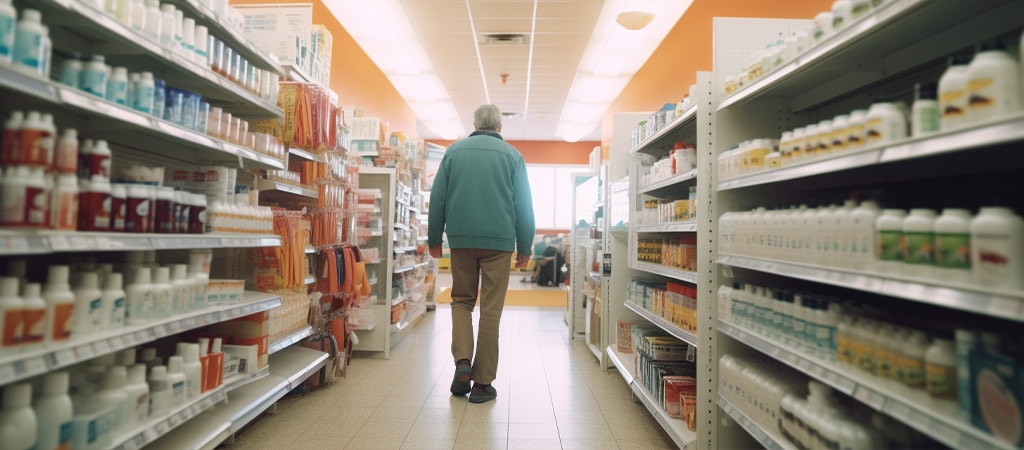Are your eye drops dangerous?! Bacterial Outbreak & Eye Drop Recalls. Listen as Marc Shuman explains the risk.
Your search for help ends here. Let’s get started, for FREE.
Did you know 80% of what we learn from the world around us is through our vision? So losing your vision may be a lot like losing your connection to the world.
But what if the product that was supposed to help you keep your eyes safe is the one that’s stealing your eyesight?
Sounds like a nightmare, doesn’t it? Unfortunately, that’s exactly what happened to several eye drop users over the last few months.
Multiple artificial tears eye drop brands caused a bacterial outbreak that led to severe infections and deaths. The CDC issued a massive recall of these products due to a rare strain of drug-resistant bacteria found in them – Pseudomonas aeruginosa.
There have been over 81 infections spread across 18 states reported so far. 14 patients suffered vision loss, four patients had to surgically remove their eyeballs, and four patients lost their lives.

Despite the recall, more cases are expected to come in, which means the lawsuits against the liable eyedrop companies are going to shoot up. There are multiple product liability lawsuits filed in 7 federal district courts so far. Most victims only started filing them in early 2023.
So if you’ve used these products and are suffering from any symptoms, we’re here to help you get justice.
Our team of experienced product liability lawyers here at Shuman Legal will get you fully compensated for your injuries.
Understanding the Bacterial Outbreak
This bacterial outbreak was first confirmed by the Centre for Disease Control (CDC) in January 2023. They had started investigating over 50 bacterial infections in 12 different states.
What was the common thread? All of the victims were actively using over-the-counter eye drops.
The bacteria was finally identified as Pseudomonas aeruginosa after extensive testing.
Pseudomonas aeruginosa usually thrives in humid environments such as soil and water. Most forms of bacteria are harmless. Many are even beneficial. But a few of them can put your health at serious risk, and Pseudomonas aeruginosa is one of them.
Back in 2017, a Pseudomonas aeruginosa bacterial outbreak led to 27,000 fatalities in US hospitals.
What makes it exceptionally dangerous is that it happens to be one of the most multidrug-resistant types of bacteria. It quickly evolves and develops resistance against antibiotics.
So there’s not much your doctor can do to put up a fight against it. All you can do is cross your fingers and hope you can dodge the more severe symptoms of Pseudomonas aeruginosa.
Here are some of the most common symptoms of Pseudomonas aeruginosa reported by the CDC:
- Unusual fluid discharge from the eye
- Reddishness in the eye
- Eye pain
- Foreign body sensation
- Increased light sensitivity
- Blurry vision
- Cornea infection
- Blood disorders
- Urinary tract infections
- Meningitis
- Endocarditis
Do You Have a Case?
Investigation into Bacterial Contamination
 First reports of this current Pseudomonas aeruginosa bacteria outbreak emerged in May 2022. According to the CDC, they linked the source of this outbreak to EzriCare and Delsam Pharma artificial tears products. They came to this conclusion after extensive chemical analysis of unopened bottles sold by these brands.
First reports of this current Pseudomonas aeruginosa bacteria outbreak emerged in May 2022. According to the CDC, they linked the source of this outbreak to EzriCare and Delsam Pharma artificial tears products. They came to this conclusion after extensive chemical analysis of unopened bottles sold by these brands.
The FDA got involved in the investigation too and put the spotlight on Global Pharma Healthcare – EzriCare’s parent company. They reported that Global Pharma Healthcare had not shared any reliable microbial testing details of their product. The same company also owns Delsam Pharma’s artificial tears eye drops, which was contaminated too.
It’s possible that these products were shipped worldwide without safe packaging or improper preservatives. This could’ve been the primary cause of the bacteria outbreak.
In Feb 2023, Global Pharma Healthcare issued a nationwide recall of their artificial tears eye drops to control this outbreak. However, this action came only after 50 serious bacteria infections had been reported across 12 states.
A month later, two more companies, Apotex Corp. and Pharmedica USA, issued eyedrop product recalls even though they had not been directly linked to this outbreak by then. recalled eyedrop products in February, though products from those companies had not been linked to infections at the time.
The FDA also updated their website with a public safety notification warning addressing this issue. They highlighted all the health risks linked to specific brands of eye drops that use amniotic fluids as ingredients. Such ingredients have not been greenlit for safe use in the US.
These eye drops may contain human cells and tissue sourced from the amniotic sac, umbilical cord, or cord blood. However, these substances haven’t gone through the necessary FDA premarket review and approval process.
The investigation is still proceeding at a fierce pace to identify all contaminated brands and contain this bacteria outbreak. It’s absolutely critical because it’s far easier to contain it than treat it.
Recalled Eye Drop Brands
While the precise cause and nature of the contamination is still being evaluated, it’s clear that Global Pharma Healthcare will be held liable. U.S. tort law holds manufacturers and retailers strictly liable for damages caused by product manufacturing defects.
The first thing to do is to stop using Ezricare and Delpham Pharma eye drops. And if you’re facing any symptoms after using them, seek medical attention right away.
Once your diagnosis is confirmed and treatment begins, it’s time to reach out to a defective product lawyer. They’ll determine if you qualify for a mass tort against the liable company, which will help you get compensated for your injuries.
Here are the six brands of artificial tears products that have been recalled so far:
- EzriCare Artificial Tears Lubricant Eye Drops – This product is the biggest culprit linked to the bacteria outbreak so far. According to the CDC, this product was logged in the greatest number of cases.
- Delsam Pharma Artificial Tears Lubricant Eye Drops – Another brand that has been directly linked by the CDC to the spread of infections. This product is also manufactured by EzriCare’s parent company – Global Pharma Healthcare.
- Delsam Pharma Artificial Eye Ointment – Although there’s no direct confirmation of this topical ointment causing the outbreak, Delsam have recalled it due to “possible microbial contamination.” This product is not directly applied to your eyeballs, but the skin around them.
- Clear Eyes Once Daily, Eye Allergy Itch Relief – This product is manufactured by Teva Pharmaceuticals. There’s no proof linking it to the outbreak so far. However, the company has chosen to recall certain batches because of a “failed impurities” test. Nearly 700,000 bottles have been recalled with the possibility of customers getting a full refund.
- Purely Soothing 15% MSM Drops – This product has no proven link to the Pseudomonas aeruginosa outbreak yet. However, manufacturers revealed that two product batches may not have been sterile.
- Brimonidine Tartrate Ophthalmic Solution, 0.15% – This eye solution is primarily for patients with glaucoma or ocular hypertension. The manufacturer chose to voluntarily recall a small batch due to concerns about their sterility standards.
Do You Have a Case?
Frequently Asked Questions
What is the cause of the bacterial outbreak?
The CDC hasn’t been able to pinpoint the exact cause of the outbreak so far. However, there are a few conclusions that are safe to make based on the nature of the bacteria and analysis of product defects.
We know that the Pseudomonas aeruginosa thrives in humid environments like soil and water. We also know that the EzriCare eyedrops didn’t use the necessary preservatives for safe shipping.
When these products get shipped worldwide, they’re exposed to a variety of environments before they reach your doorstep. It’s likely that the product batches got spoiled during this phase, leading to the bacteria outbreak.
What are the symptoms of an eye infection related to the outbreak?
Here are the most common symptoms of an eye infection triggered by Pseudomonas aeruginosa:
- Strange fluid discharge from the eye
- Redness in the eye
- Eye pain
- Sensing the presence of foreign bodies on your eyeball
- Greater sensitivity to light
- Blurry vision
- Infected cornea
How is Pseudomonas aeruginosa bacteria naturally found?
Pseudomonas aeruginosa is natural found in humid conditions. It grows and multiplies easily in places where there’s an abundance of soil and water.
It can often be found near drains, pipes, cleaning products, and hospital equipment.
What is being done to investigate the source of bacterial contamination in eye drops?
There are multiple ongoing investigations led by the CDC and FDA to understand the source of the problem. The CDC initially broke the news about the initial outbreak connected to the contaminated batches of EzriCare products.
The FDA kicked off a more detailed investigation to identify the role of Global Pharma Healthcare behind the outbreak. Safety inspectors exposed several product sterilization failures and other problems that may have triggered the bacteria outbreak.
An important filtration process used for sterilization was not operational. Plus, the factory’s aseptic cleaning room was not properly ventilated to stop bacterial growth.
They also reported that Global Pharma Healthcare failed to provide them with any microbial testing reports of their product.
Which eye drop brands have been recalled and why?
Here are some of the recalled eyedrop products that you should know about:
- EzriCare Artificial Tears Lubricant Eye Drops – Directly connected to the bacterial outbreak. Led to the highest number of cases so far.
- Delsam Pharma Artificial Tears Lubricant Eye Drops –Directly tied to the spread of infections. It is manufactured by Global Pharma Healthcare as well.
- Delsam Pharma Artificial Eye Ointment – No direct link to the bacterial outbreak. However, concerns about a “possible microbial contamination” led to its recall.
- Clear Eyes Once Daily, Eye Allergy Itch Relief – No proven connection to the bacterial outbreak. They’ve recalled nearly 700,000 bottles after a “failed impurities” test.
- Purely Soothing 15% MSM Drops – No connection to the outbreak, but the manufacturer recalled two batches due to product sterility concerns.
- Brimonidine Tartrate Ophthalmic Solution, 0.15% – No link to the outbreak, but a small batch has been recalled because of product sterility concerns.
How can consumers identify the recalled products?
It’s important to identify whether you’ve accidentally purchased a recalled batch of eyedrops or not. It’s the only way to secure your health and help contain the outbreak.
The CDC, FDA, and DrugWatch websites have listed all the recalled brands along with the manufacturing codes of the affected batches. You can check them out to clear your doubts.

Are there any other eye drops affected by recalls?
Only six eyedrop products that we have shared above have been affected by the recalls so far. However, it’s recommended to stay away from any medical products that use ingredients not approved by the FDA.
Are Purely Soothing 15% MSM Drops and Brimonidine Tartrate Ophthalmic Solution, 0.15% linked to the bacterial outbreak?
No. Both of these brands have no proven link to the bacterial outbreak. They’ve recalled a few batches due to concerns about their products not meeting the necessary sterility standards.
What should individuals do if they have used the recalled eye drops?
If you’ve used any of the recalled eye drops, the first thing you should do is get a medical check-up. It’s important to do this even if your symptoms aren’t too noticeable. Based on current research, infection symptoms start showing up within 12 to 24 hours.
It’s essential to get an official diagnosis and follow the treatment protocol given by a doctor.
Once you’ve done this, it’s time to reach out to an experienced product liability lawyer to get compensated by the liable company.
Call us for a free case review and we’ll get the ball rolling to help you recover.
How can individuals seek medical care if they experience symptoms of an eye infection?
Pseudomonas aeruginosa is extremely challenging to treat because of its high resistance to antibiotics.
Your doctor will prescribe the right type of antibiotics based on the severity of infection. Severe infections may require you to take different types of antibiotics through an IV for weeks.











